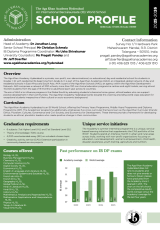Offering globalisation locally - the PLES programme
As the world takes to globalisation, communication has become of the key factors for our interconnectedness. Being bilingual takes one to places beyond what their contexts can offer, and the Telangana state government attempted to prepare students to reach new heights using this paradigm by introducing English as a medium of language in public schools. However, as all great ideas do, this too arrived with an obstacle. Government teachers could not cater to the new curriculum and struggled to teach in a foreign language. The impediment allowed the Academy to do what it values most, giving back to the community and thus came The Professional Learning for Educator Series programme, the PLES.
Initiated in 2010 by Mr Rajan Thampi, the PLES programme aims to empower, equip and support government school teachers with skills in the English language to ensure that purpose of the medium change is fulfilled with the intended effect. The programme aligns with His Highness’s vision to share expertise with local communities and remains altruistic.
Over the years, The Telangana government announced that and an increasing number of government schools were to adopt English as their primary language of instruction. This presented a dilemma as the existing teachers lacked the confidence to teach in a foreign language and employing new teachers was expensive. The academy saw an opportunity in their predicament and approached the government and offered to train the teachers using modules developed by the academy itself. Once the memorandum of understanding had been signed, the PLES programme was ready to welcome its first batch of teachers.
A decade later and the programme still strives to support teachers from various backgrounds in Telangana, with their most recent batch of 65 participants graduating on the 25th of November 2022. The process of selecting each batch is executed with the intent to pick out passionate teachers in making a difference in the country’s future. The teachers had to sit through an assessment, called the intake test.
Once they were in the programme, the teachers went through intensive training in methods and skills they needed to teach in English. During the 30 days that they spent in PLES, The teachers experienced interaction sessions with academy teachers and students and had multiple opportunities to practice the English language and demonstrate their skills. The learning each day was invaluable for the teachers, and the instruction was even more for Amanda and Rajan. Amanda shares that the teachers expressing their excitement about learning new skills and concepts was her highlight for this year’s batch. Additionally, their ability to contextualise the programme and use their school textbooks for classes 6 to 11.
However, the effects of the programme don’t simply remain between the walls of the Academy. For many, the programme helped develop more than skills, it gave confidence, individuality, memories and more importantly, bonds. In one instance, one of the teachers who froze in panic while giving a presentation was encouraged by people who were mere strangers a month ago. The PLES programme took several individuals and brought together one fraternity that still strategises and discusses teaching over chat groups beyond the bounds of towns and villages.
The PLES programme, initiated to take forward His Highness’s vision impacted hundreds today, teachers, students and governments. The programme took in the shy, uncertain teachers and produced a confident community of individuals who integrate and apply their learning in the classroom every day and make India’s future better, one lesson at a time.
Amulya Madasu, Diploma Programme 1





